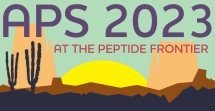Scott J. Miller
Yale University
Talk Title
New Catalytic Modalities for Peptide-Based Asymmetric Catalysis
Presentation Time
SESSION 9: PEPTIDE SYNTHETIC METHODS & GREEN CHEMISTRY APPROACHES
Wednesday, June 28, 2023, at 08:30 am - 08:55 am
This lecture will describe recent developments in our efforts to develop catalysts for asymmetric reactions, in particular for the preparation of densely functionalized, stereochemically complex structures. Over time, our foci have been on enantioselectivity, site-selectivity and chemoselectivity. In much of our current work, we are studying issues of enantioselectivity as a prelude to the extrapolation of catalysis concepts to more complex molecular settings where multiple issues are presented in a singular substrate.
A particular focus of this lecture will be the incorporation of new catalytic functionality that enables an expansion of the reaction types and mechanistic paradigms that may be applied amidst selectivity-defining noncovalent interactions that are signatures of peptide-catalyzed processes.
Complex molecule synthesis is one of the key disciplines of modern chemical research. The development of new methods for the synthesis and derivatization of such structures is a multi-dimensional activity involving reaction design, development, and application. Research in our group focuses on each of these aspects of chemical synthesis. Utilizing the architecture and design principles presented by biologically relevant structures and processes, we seek to discover new reactions and to apply new principles to the selective synthesis of complex molecules.
As part of this program, we bring to bear the full arsenal of modern synthetic chemistry. Employing rational design, combinatorial screening and a constantly evolving collective intuition, we are working to discover new chemical transformations that enable the rapid synthesis of stereochemically complex structures. In addition, we are investigating the development of new catalysts for the selective functionalization of these molecules.
A particular interest is in the catalytic modification of natural products. These studies are enabling access to an expansive set of biologically inspired natural product analogs. A key component of all of this work is the determination of the fundamental molecular interactions that are responsible for reaction selectivities. As a result, mechanistic analysis is at the heart of many of our studies.


